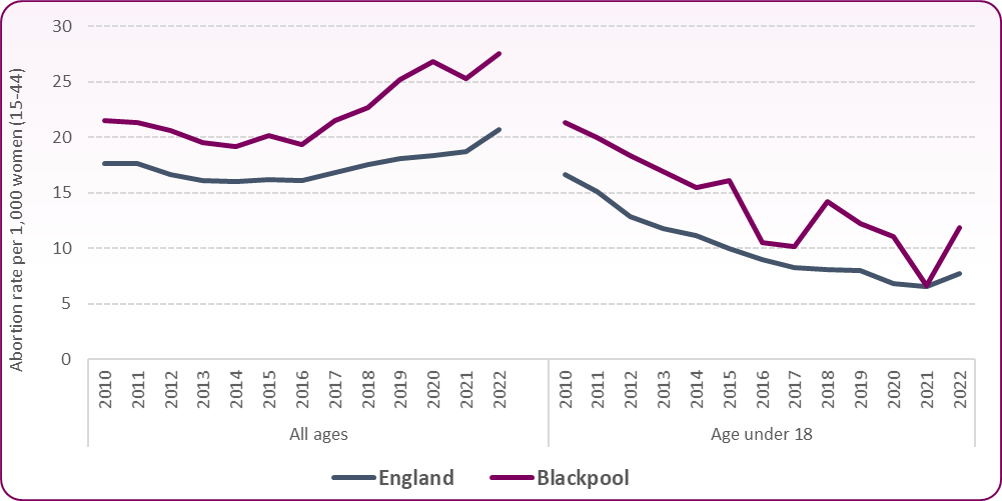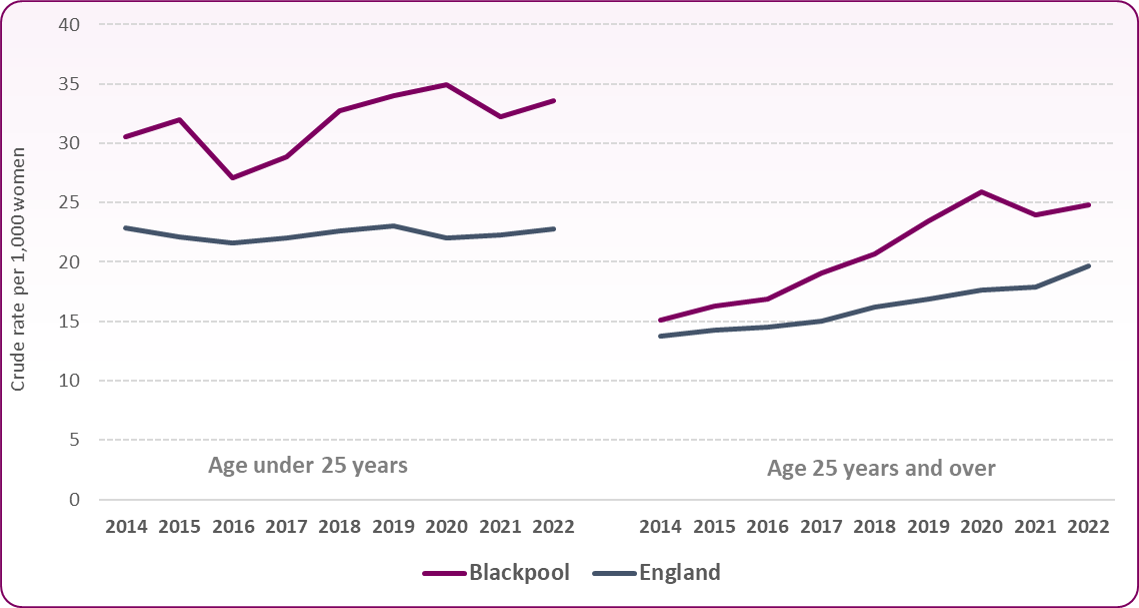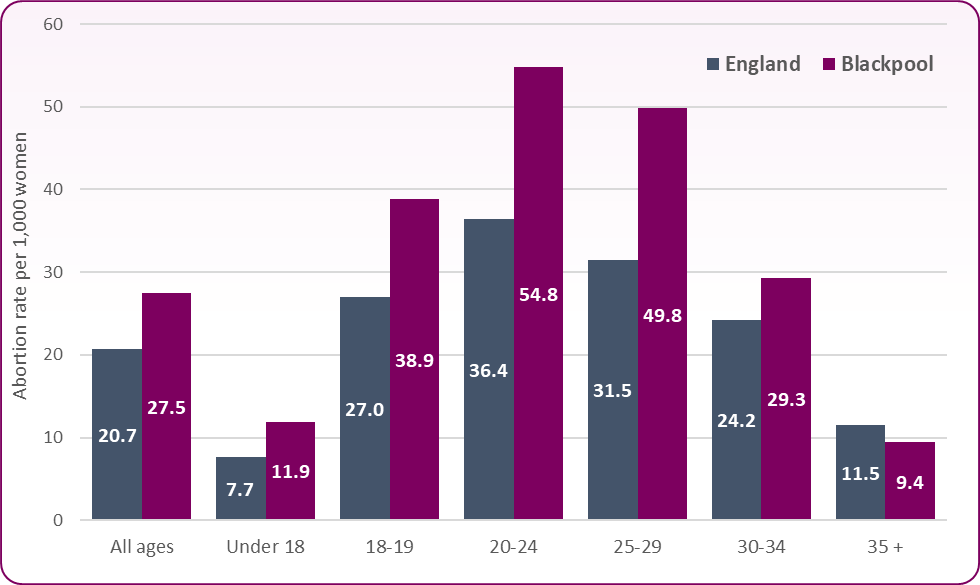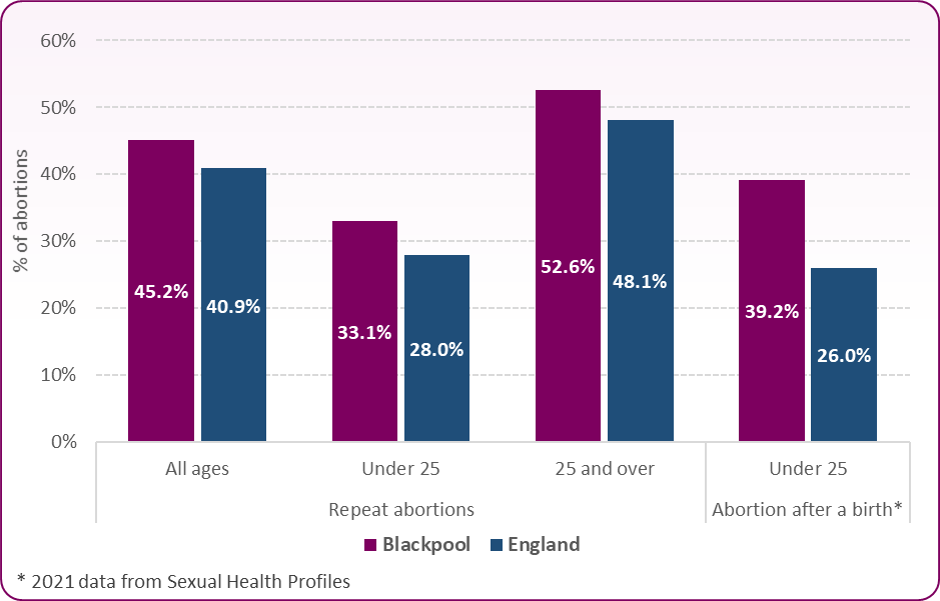Abortions
Last Modified 13/03/2025 10:18:53
Share this page
Introduction
One proxy for unintended pregnancy is information on abortions to understand which women are more at risk of an unintended pregnancy. Reducing unwanted pregnancies is an ambition in the Department of Health's Framework for Sexual Health Improvement in England (2013). The Department of Health's policy also states that women who request an abortion should have early access to services if legally entitled to an abortion under the Abortion Act 1967. Although Integrated Care Boards (ICBs) are now responsible for commissioning most abortion services, local authorities are responsible for commissioning comprehensive sexual health services including contraception services and advice, and sexual health specialist services such as young people's sexual health and teenage pregnancy services, outreach, sexual health promotion and services in schools, colleges and pharmacies.
No clinical procedure is entirely risk-free and it is preferable that women have access to and use reliable contraceptive methods that prevent unplanned and unwanted pregnancy. High termination rates, along with high rates of sexually transmitted infections (STIs) are also an indication of poor sexual health in the population.
Facts and figures
Data from the Dept for Health show that for women resident in Blackpool in 2022:
-
- The total number of abortions was 714, up from 619 in 2021
- The age standardised abortion rate was 27.5 per 1,000 women aged 15-44. This is an increase from the rate of 25.3 in 2021 and significantly higher than the England average of 20.7 per 1,000
- Both the England and Blackpool all age abortion rate has been rising since 2016, however, Blackpool's rate is rising faster than is seen nationally (Figure 1)
- Like the national picture, the abortion rate was highest for women aged 20-24 years (at 54.8 per 1,000) with rates in Blackpool significantly higher than the England average of 36.4 per 1,000 (Figure 3)
- Over a third (38%) of abortions in Blackpool are to women aged under 25, this compares to 36% nationally
- The under 18 abortion rate, while higher than the England average, has with some variation, generally followed the same decreasing pattern, though 2022 did see a sharp increase on the 2021 rate
- There were 27 abortions to young women aged under 18 in Blackpool in 2022, a rate of 11.9 per 1,000. This compares to the England average of 7.7 per 1,000. See Teenage Conceptions for further information on under 18 abortions.
Figure 1: Trend in abortion rate (all ages and under 18), 2010-2022, Blackpool and England
 Source: Dept of Health, Abortions Statistics, England and Wales
Source: Dept of Health, Abortions Statistics, England and Wales
Blackpool has seen quite a sharp increase in the overall rate of termination of pregnancy (all ages), which is significantly higher than the rate for England. However, this disguises the variation in rates between the different age groups. Similar to the national picture, rates are currently highest in the 20-24 year olds and 25-29 year olds (Figure 3). Nationally, data does show rising abortion rates in those women aged over 25 years while for those aged under 25 year the picture is generally static. This is different to what we see across Blackpool where rates are rising for both the under 25's and the over 25's (Figure 2)
Figure 2: Trend in abortion rates in women aged under 25 and 25 and over in Blackpool and England, 2014 - 2022
 Source: PHE, Sexual and Reproductive Health Profiles
Source: PHE, Sexual and Reproductive Health Profiles
Age specific abortion rates are significantly higher in Blackpool for all age groups (except age 35 and over) when compared to the England average.
Figure 3: Age specific abortion rates, Blackpool and England, 2022
 Source: Dept of Health, Abortions Statistics, England and Wales
Source: Dept of Health, Abortions Statistics, England and Wales
Abortions under 10 weeks
The Department of Health's policy is that women who request an abortion should have early access to services if legally entitled to an abortion under the Abortion Act 1967. The earlier abortions are performed the lower the risk of complications. Prompt access to abortion, enabling provision earlier in pregnancy, is also cost-effective and an indicator of service quality.
Department of Health data shows that in Blackpool in 2022:
- 91% of abortions were carried out under 10 weeks. This compares to 79% in 2010 and 81.3% in 2015.
- 96% of NHS funded abortions in Blackpool are carried out by the independent sector compared to 82% across England.
Figure 4: Abortions by Funder and Gestation, 2022
| | Total number of abortions | Purchaser (%) | Gestation-weeks (%) | NHS funded abortions under 10 weeks gestation |
|---|
| NHS Funded | Privately Funded | 2-9 | 10-12 | 13+ | NHS funded abortions | NHS funded abortions at under 10 weeks |
|---|
| NHS Hospital | Independent Sector | Number | Number | % |
|---|
| England |
239,926 |
16.4 |
82.0 |
1.7 |
88.0 |
4.9 |
7.1 |
235,952 |
217,160 |
92.0 |
| North West |
36,675 |
19.2 |
80.2 |
0.6 |
90.1 |
4.1 |
5.8 |
36,462 |
34,009 |
93.3 |
| Blackpool |
714 |
2.8 |
95.7 |
1.5 |
89.4 |
3.5 |
7.1 |
703 |
640 |
91.0 |
| Source: Dept of Health, Abortions Statistics 2022, England and Wales |
Medical abortions now account for 86% of the total of all abortions nationally. The choice of early medical abortion as a method of abortion is likely to have contributed to the increase in the overall percentage of abortions performed at under ten weeks gestation. Early medical abortion is less invasive than a surgical procedure and carries less risk as it does not involve instrumentation or use of anaesthetics1.
-
- In Blackpool in 2022, 636 (89.1%) of the abortions performed was medical.
- This compares to 86.2% nationally.
Repeat abortions and abortions after birth
More than a quarter of England abortions in the under 25 year old age group are repeat abortions. This is an indicator of access to (or lack of) good quality contraception services and advice as well as problems with individual use of contraceptive method.
Across Blackpool in 2022:
-
- Almost half (45.2%) of all abortions were repeat abortions. This compares to 40.9% across England
- Of the 323 repeat abortions, 89 were in women aged under 25 and 234 in women aged 25 and over
- The proportion of repeat abortions in women aged under 25 years was 33.1% in 2022. This compares with 28% nationally
- For women aged over 25 years, the proportion of repeat abortions was 52.6% across Blackpool compared to 48.1% nationally
- The repeat abortion rate has been increasing gradually both locally and nationally over the last few years. Across Blackpool, 2020 saw a stepped increase in the under 25 repeat abortion rate with the main increase being in those women aged 19-24 years. However, this has dropped back down in 2022 and is not significantly different to the England average.
The proportion of women having an abortion after a birth is a guide to awareness of post-partum contraception need at a local level and the possible need to develop more effective "secondary prevention" interventions to help the first-time pregnant and parenting young people manage their future reproductive lives and prevent further unplanned pregnancies.
- There were 193 (39.2%) women aged under 25 in Blackpool who had an abortion after a previous birth in 2021
- This is significantly higher than the national average of 26% and the highest rate in the North West.
Figure 5: Proportion of repeat abortions and abortion after a birth, 2022
 Source: Dept of Health, Abortions Statistics 2022, England and Wales
Source: Dept of Health, Abortions Statistics 2022, England and Wales
Women who may need additional support
- Women having repeat terminations
- Women with existing health conditions, which may make having a termination a riskier procedure
- Younger women
- Women experiencing sexual exploitation / sexual violence
- Women refusing post-termination contraception
Current Services
Lancashire and South Cumbria ICB commission 3 providers of termination of pregnancy. Early medical terminations are available in Blackpool through Marie Stopes International (MSI) and South Manchester Private Clinic (SMPC) and in Preston through MSI. Surgical terminations are available in Stockport through SMPC and Manchester through MSI. The British Pregnancy Advisory Service (BPAS) also provide terminations out of Blackpool and Lancashire, for those women wishing to access them out of the area.
Locally, termination of pregnancy services offer contraception, including long acting reversible contraception (LARC) to all women using their service, in an effort to prevent subsequent unplanned/unwanted pregnancies and repeat terminations. They also supply condoms and undertake Chlamydia and HIV testing.
Any women with existing health conditions that may make procedures higher risk, can access medical and surgical terminations through Blackpool Teaching Hospitals Trust.
National and local strategies and guidance
Comprehensive Abortion Care (Best Practice Paper No. 2), Royal College of Obstetricians and Gynaecologists, 2015 - The paper sets out the essential elements of a high-quality abortion care service including comprehensive post-abortion care and contraception.
Comprehensive Postabortion Care (Best Practice Paper No. 3), Royal College of Obstetricians and Gynaecologists, 2016 - sets out the essential elements of postabortion care.
NICE guideline [NG140] Abortion care, September 2019
NICE guideline [PH51] Contraceptive services for under 25s, March 2014
Dept of Health and Social Care, Sexual and Reproductive Health Profiles, Abortions under 10 weeks that are medical